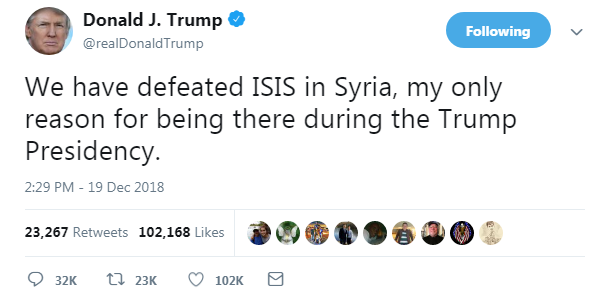
On December 20th, 2018, the President of the United States Donald Trump unexpectedly declared the US would withdraw its troops from Syria, declaring the military operation against Daesh to have been successfully completed by stating: “we’ve beaten them badly”. As a consequence, he announced the withdrawal of the estimated 2000 US troops from the Syrian territory. Despite previous similar statements, the decision came to a surprise to the other parties of the Syrian conflict, both allies and foes, triggering a series of reactions on the field.
Shock in my Town: the Reactions from the US and its Allies in Syria
The day after Trump’s announcement, the US Secretary of Defense Jim Mattis resigned over the assertion that his views were not aligned with those of the President regarding relations with US allies, nor on Russia and China. Other members of the US Administration, such as the National Security Advisor John Bolton, amended Trump’s statement on Daesh being “badly” defeated (most recently, the 17th January an attack claimed by ISIS killed 4 US agents) and rectified the plan for a precipitous pullout. As a consequence, the US has now deployed additional troops to Syria, in order to gradually prepare the withdrawal. The pullout is currently expected to take place over the course of several months, however only after a clear agreement with US Allies in Syria is met. The initial reactions to Trump’s abrupt announcement were tense and concerned. He had both failed to communicate his military intentions in Syria to his own administration and raised considerable concerns among allies in the region. The Economist editorial titled “The End of American Hegemony” presaged “unpredictability, ineffectiveness and prolonged chaos”. The main criticism against the withdrawal generally concerns three main points: the possible comeback of Daesh; the growing impact of Russia, Iran and Assad in Syria; and the end of US support to the Democratic Federation of Northern Syria, the Kurdish region of the country that risks being attacked by Turkey.
The Withdrawal and its Discontents
Daesh lost 95% of the territory it controlled in 2015. As of today, the most active group fighting the so-called caliphate is most notably the Kurdish People’s Protection’s Unit (YPG). From a military standpoint, the 2000 US troops do not constitute a crucial element in the fight against terrorism. The main relevance of the decision to withdraw is indeed more symbolic than strategic, a choice that could feed into Daesh’s military propaganda.
The prevailing psychological and diplomatic, rather than practical, effect of the withdrawal also emerges from the relationship between the US’ enemies in Syria: Russia, Iran, and the Government of Damascus. Trump’s position clearly reduces the US’ influence in the post-conflict country, a military decision worrisome to some allies as well. In fact, Israel reacted by bombing Iranian positions in Syria as a consequence of the faltering support of the Americans in the region and the perception that the abrupt announcement conceded a strategic advantage to US and Israel adversaries. What emerges from this reckless strategy is a lost opportunity to use the withdrawal as a means to negotiate concessions or guarantees from the other parties of the conflict beneficial to the US and its allies.
The Democratic Federation of Northern Syria, also known as Rojava, is possibly the party of the conflict which is most affected by the withdrawal. Militarily and financially supported by the US, the Kurdish region constitutes the main adversary of Daesh. At the same time, Rojava has been in the midst of pioneering a political system based on participatory democracy, gender equality, minority rights, ecology and secularism. Its experimental model of administration received international legitimacy as a result of both its struggle against the Daesh and its model of a system of governance based on respect for human rights and multicultural coexistence. Turkey, however, considers the Kurdish administration as an organization linked to the PKK, a group responsible of acts of terrorism in Turkish territory. In fact, in January 2018, Turkey invaded the Syrian territory with a military campaign against the Kurdish groups in Afrin. The US withdrawal could now constitute a green light for Turkey to develop the military operation and defeat the entire Kurdish region. As previously mentioned, the US’ support to Rojava does not consist of the 2000 troops deployed on the field but rather a diplomatic obstacle to Turkey, the second largest armed force in NATO. However, the US seems to contradict itself when conditioning the pullout to a total protection of the Kurdish region, threatening to devastate Turkey’s economy in case of an attack. Analysts warn about an imminent invasion of Rojava (by who? The US? Daesh? ). Beyond the position of the US, the future of the Syrian Kurds still depends on the capacity to find (who needs to find the agreement? The Syrian Kurds with Russia/ Damascus?) an agreement with regional actors, e.g. Russia and the Government of Damascus.
War is too serious a matter to entrust to military men
In a context of extreme uncertainty, it is possible to identify some clear points emerging from the previous analysis. The US military presence in Syria has a symbolic and diplomatic, rather than military, relevance, as does the announcement of the withdrawal. Trumps abrupt decision probably hindered a more effective negotiation with all the parties to the Syrian conflict. Still, the US hold a strong diplomatic power and has the capacity to achieve its political goals, such as defeating Daesh and protecting Rojava, independently from the 2000 American troops on the field. As far as the military force is replaced with diplomatic efforts, the end of the – moreover illegal – US military operation in Syria constitutes a positive development for the Syrian conflict.































